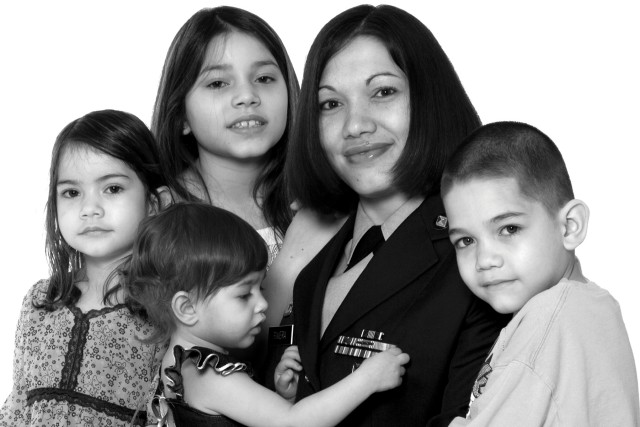STUTTGART, Germany -- When Uka Meissner-DeRuiz began working for the U.S. Army in 1965, she was stunned to find women serving in the military. "I was surprised. It was a cultural shock, I do admit," she said.
Years later, the idea still fascinates the German photographer. It's a theme she continually explores in her work.
Meissner-DeRuiz's "Military Moms" photo exhibit, the third in a series focusing on women in the military, opened at the Deutsch-Amerikanisches Zentrum/James-F.-Byrnes-Institut in downtown Stuttgart Sept. 17.
The exhibit, which runs through the end of October, features 22 female Soldiers, Sailors and Airmen from the Stuttgart Military Community, their children, and, occasionally, their spouses.
"I think it really captures the essence of the modern military woman's spirit toward family," said Tony Black, a U.S. Army Garrison Stuttgart employee and former Soldier, during the opening. "I know about 75 percent of these women. They've been combat-tested, they are sensitive to others, they have sound judgment - and this just personifies, 'be all you can be.'"
Meissner-DeRuiz, who married a U.S. Soldier in 2003, knows most Americans will appreciate the exhibit.
Yet, she said the purpose of "Military Moms" is to enlighten and educate Germans. "I want to get people thinking ... to reexamine their values, and the male and female roles. That's been my motivation since I started this," she said.
At the exhibit's grand opening, she got her wish. Georg Pfauter, a German visitor, wrote in the guest book that, on the one hand, it was shocking to see a pregnant woman wearing a military uniform, and yet, he was able to see how very different Americans and Germans think and feel about the military. He wrote he was grateful for the exhibition, because it allowed him to experience the American mentality.
Erika Alber, a local German artist, pointed out that not too long ago, women weren't even allowed to serve in the German army. "I think it's great that it's possible now."
In fact, until 2001, the German armed forces had one of the most conservative gender policies of any NATO country - women were only allowed to serve in the medical service or a military band.
"There are many German women - my age and older - who say if they'd had [the choice to serve in the military], they would have taken it. It's an option we never had," said Meissner-DeRuiz, who, in 2008, retired from U.S. Army Garrison Stuttgart's Directorate of Family and Morale, Welfare and Recreation as a supervisory arts specialist, after 43 years of service.
Her first 'Women in the Military' show was held in 1997.
Meissner-DeRuiz followed it with a second exhibit, "Women in the Military II," in March, 2001. "I took photos of female service members in their uniform of choice, and how they wanted to present themselves as private people," she said.
Just a few months after that second show, Meissner-DeRuiz discovered another angle she wanted to explore. "Sept. 11 came, and I knew I wasn't finished," she said.
"We had female Soldiers who were going downrange, and that's when I started to think about a smaller segment of women in the military - military women who are mothers - because this is a concept completely foreign to Germans," she said.
"As a mother and a grandmother, I wondered how do you cope with it, and what is your logistic support'" Meissner-DeRuiz added.
"In Germany, you don't have day care centers and nurseries like the U.S. military provides," said Meissner-DeRuiz. "I have been so impressed with how the U.S. military takes care of these women."
After mulling over the idea for several years, Meissner-DeRuiz began to work earnestly on the third installment in 2006.
But in a post 9/11 world, it was difficult getting models to participate.
"Since 9/11, people are a little bit more worried about offering any personal information outside of the military circle," she said.
Because the exhibit was intended first for a German audience, Meissner-DeRuiz took extreme care that names were not shown in the photos, using image editing software to block them out, if necessary.
"I've been around the military long enough to be cautious of these things, and we are in very difficult times," she said.
Perhaps it's why a Marine is not represented in the exhibit. "Unfortunately, I think the Marines were too reluctant to step in front of my camera, this time," said Meissner-DeRuiz. "But, there is hope - this is an open and ongoing project."
As she begins to contemplate her next "Women in the Military" theme, she has hopes that the "Military Moms" exhibit will be seen by a wider audience.
"My goal is to exhibit the show in Heidelberg, where Germans and Americans can see it, and I would like to bring it to the Women In Military Service For America Memorial exhibit gallery in Washington, D.C. I think the moms belong there," she said.
Meissner-DeRuiz appreciates that there are alternative ways of structuring one's life. Observing women in the U.S. military showed her "that I too have the freedom of choice in how to live, and of course, the attached responsibilities," she said.
"I am forever grateful for having been able to have that experience over the years," said Meissner-Ruiz. "The exhibit is my way of saying thank you."
The 'Military Moms' exhibit is open Tuesday, Wednesday and Thursday from 2-6 p.m. through the end of October.
The Deutsch-Amerikanisches Zentrum/James-F.-Byrnes-Institut is located at Charlottenplatz 17 in downtown Stuttgart.


Social Sharing